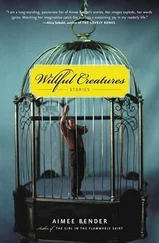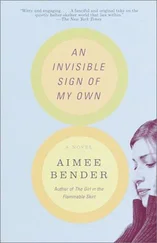At the door, she stood for an extra moment, looking to the side, and she seemed to be watching the squat palm tree in the house across the way as it swayed a little.
Are you Madame Dupont? I said, thinking of the small precise type at the bottom of the menu, with her name and Monsieur Dupont’s as owners and co-chefs.
She blinked, yes.
I love your cooking, I said. You make spinach taste like spinach, I said. I stumbled, embarrassed. Sorry, I said. I could go on and on. I don’t know how to say it right.
You’re saying it fine, she said. Thank you. She fiddled with the doorknob. Why are you in the alley?
I glanced around. Pigeons pecked at the trash. Could I work here, in some way? I asked. On weekends?
She craned her head forward, as if to hear me better. Brushed a little dirt off the step with her slipper.
As a waiter? she said. Waiters apply in front.
I shook my head. No, I said. Not that. Through the back door, I said. Through the food.
Sherrie flashed through my head, years-ago Sherrie, who I’d heard had gone on to sing old standards at piano bars in San Francisco.
Well, I suppose you could take out the trash, she said, reaching back into the kitchen and bringing out another full white bag.
Okay, I said, stepping forward.
Okay? said Madame. She handed it over. Patted her cheek. And we do need a Sunday and Wednesday dishwasher, she said. Our dishwasher just got a job in a movie. Playing a dishwasher.
Please, I said. I walked to the Dumpster and tossed the bag in. I’d love that, I said.
You love washing dishes?
I brushed off my hands. I would here, I said. I do.
Grandma died. In Washington. She checked into the hospital, prepared. For her final mailing, she’d given a priority-mail package to the head nurse with careful instructions and our address written on it in big black pen.
To the hospital, she brought a suitcase that contained her nightgown, pills, and pale-blue felt slippers. She died at ninety-one. Mom flew up to the funeral, assumed the ashes would stay in Washington, and arrived home around the same time as the package: pale-blue felt slippers, an empty bottle of pills, and a teak box with carvings of elephants on the rim, inside of which were the soft gray heaps.
Mom ran fingers over the half-circles in the elephant feet. She picked this box? she murmured. I made this box, she said. She turned it over and a few bits of ashes crept out the lid and sifted to the carpet. Sure enough, at the base: L.M.E. carved into a corner. It was the closest I ever got to seeing my grandmother give my mother a hug.
Mom kept herself very busy at the studio, and she did not mention Larry to me again. She made benches, stools, and trunks. Boxes, tables, shelves. No one could take out her splinters like Joseph had, so when Mom came home with clear hands, I never knew if Larry was doing it or if she had just started taking greater care as she worked the planes of wood. I’d never liked seeing my brother take the splinters out of her fingers, nestled up next to her on the couch, side by side, dipping into that bowl of water. For so many years I’d watched the two of them together and I often felt the urge to stay in the living room, like they needed some kind of chaperone. But as I chopped and baked and stirred and walked, they would float in my head, these splinters, new. Joseph had never carved any wood, but he was more connected to things than I’d realized, and by taking the splinters out of her hand, it felt to me now like he’d been almost pulling himself out of her. That at the same time of this very intimate act of concentrating so carefully on the details of our mother’s palm and fingertips, he was also removing all traces of any tiny leftover parts, and suddenly a ritual which I’d always found incestuous and gross seemed to me more like a desperate act on Joseph’s part to get out, to leave, to extract every little last remnant and bring it into open air.
I found the pair on the shelf of the medicine cabinet, the twelve-dollar tweezers with the angled sharp tips. I cleaned them in peroxide and brought them to a beauty supply shop on Melrose that did makeovers. Just in case you need a spare? I offered. The woman behind the counter eyed me suspiciously, but when she saw how nice the tweezers were, she shrugged and dropped them into her big box of makeup.
As my high-school peers went through their later years of college, I worked my free time at the restaurant and days at the cable TV office. Through the subtle shifts of Los Angeles seasons, a movement back and forth through forty degrees, and then through those subtle shifts again. During my free time, I continued to tour the kitchens of L.A. from Artesia to the Palisades. My old rival Eddie Oakley called up out of nowhere one summer evening and we went out a few times, finally having sex on his junior-year college-apartment medium-blue sheets. Cool, he said, patting my arm, afterwards. Full circle, he said.
I slept in his bed for a half-hour, just to try to imagine what it felt like to live there. With car clattering sounds below. With everyone nearby his own age, hollering down the hallways, feet running over a beer-splashed carpet.
On every Sunday morning and Wednesday night, I showed up at La Lyonnaise right on time and I parked myself in front of the sink and cleaned dish after dish after dish. Apparently I was the most grateful dishwasher any of them had ever met. I loved the job; I kept myself focused on clearing the plates, on rinsing the bowls, absorbed in the smells of the kitchen, of piles of chopped onions and rolling pins flattening pastry dough, next to the bubbling pots and sizzling pans, and it was good for me just to be there, to spend as much time there as I could.
At home, my mother no longer woke up in the middle of the night-possibly because she was not in the house at all-and if the living-room light flipped on at 2 a.m. it was my father, up, sometimes having come in from a late-night run. He did not drink tea, but he poured himself a glass of water and then settled into that same orange-striped chair, the vortex of late-night parental thought. I would often hear pages turning of some thickly bound book, and in the muted haze of half-sleep I wondered what he was reading.
George still called once a month or so, and first he had a new girlfriend, who he said was really nice, and then she was his regular girlfriend, and he said she really wanted to meet me, and then he called her his fiancée, and then, in the mail, I received the opalescent envelope invitation, inked in calligraphy. I sent back the little rectangular return card with an attempt at a happy face next to my name: Attending. Steak.
A skinny man at the office, Peter, asked me out. He worked down the hall, in marketing. What? I said, when he asked. I hadn’t noticed him much before, with his thick brown eyebrows and earnest voice. He repeated himself. He waited at my desk, squirming slightly, scratching his chin. I wasn’t sure what to do, and steely factories flashed through my mouth, uncomprehending, but I bit the side of my cheek and told him sure.
When he asked what I liked for dinner, I countered with a walk.
A walk? he said. Great.
Later that week, after work, we exited the office and walked up Gower together, across Fountain, up Vine to Franklin, crisscrossing past landmarks of Hollywood, churches, stone buildings, miniature landscaped parks. For full sections of the walk we had nothing to say. It wasn’t a shocker; at work, once I paid attention, it seemed he could not always maintain eye contact in the general social arena, and when asked about himself would go on about the wrong part of the question without even knowing. He spent the first ten minutes of our walk nervously explaining his latest shoe-purchasing experience to me, and then we just walked. I didn’t mind the quiet stretches. It was like we were trying out the idea of being side by side. We stared at the sidewalk as we went, but he did not ridicule me for living at home and not going to college, and when he asked about what I was interested in and I couldn’t come up with an easy answer he said it was a far more complicated question than it appeared. Up on Franklin, we had a good conversation about funny grandparents. We stood in the lobby of the Roosevelt Hotel and smelled the old stone pillars. I said it would be nice to see him again. At the end, near my car, I reached out a hand as a thank you, and he stumbled forward to kiss me. His arms pulled me close, and for a second, half a second, all his hitches fell away and he held me with what could only be called confidence. Then we both stammered through a goodbye and fled into the corners.
Читать дальше












